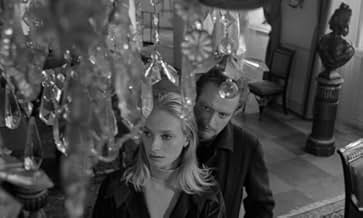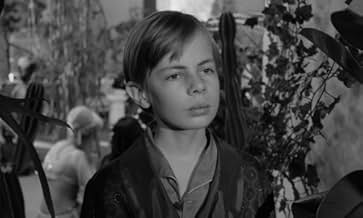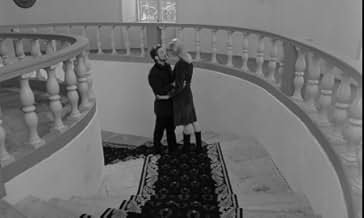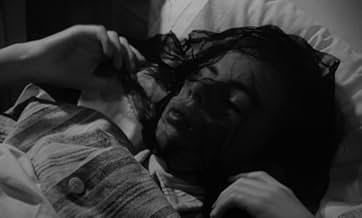AVALIAÇÃO DA IMDb
6,3/10
853
SUA AVALIAÇÃO
Adicionar um enredo no seu idiomaThe story about a man who's trying to get rid of his memories from his past. He grew up in an upper-class family in a castle and now revisits the castle with his fiancee.The story about a man who's trying to get rid of his memories from his past. He grew up in an upper-class family in a castle and now revisits the castle with his fiancee.The story about a man who's trying to get rid of his memories from his past. He grew up in an upper-class family in a castle and now revisits the castle with his fiancee.
- Direção
- Roteiristas
- Artistas
- Prêmios
- 1 vitória e 1 indicação no total
Avaliações em destaque
Pauline Kael called this movie a combination of "the worst of Fellini and the worst of Bergman," and glib as that sounds, she's right--it exactly locates the leading pretensions of the era's art cinema flavors, and combines them in a particularly superficial and flashy way that lacks either great director's depth, originality or humor. The rather confused structure interweaves past and present as the grown heir to a country estate brings his fiancee there, where he recalls his difficult childhood being alternately amused, abused and ignored by self-absorbed parents. The latter use their wealth and privilege to be kingpins of a cartoonishly decadent social scene. But the film isn't satire--we're meant to take its grotesques very seriously as some statement about, you know, Society, though they only resemble figures from other movies. At the end we're apparently to understand that the present-day characters have somehow been liberated from the chains of the past, but that catharsis rings hollow, particularly since those characters are just as one-dimensional as the wealthy sinners in the flashbacks.
Zetterling's other directorial movies are said to be good, so maybe this was just her auteurist folly, all too obviously derivative of other auteurs' follies. But the imitative quality robs of it any genuine emotion, or even pleasure in flamboyance, though it's well-shot and edited. There's some nudity, a scene about (though not graphically depicting) masturbation, and other content that must have seemed terribly shocking in 1966. (Indeed, the film's most lasting notoriety came from Shirley Temple Black having quit a festival jury in a highly publicized huff over the inclusion of this "pornography." Little did she know how much more pornographic movies would get, or how soon.) But the problem here is that there's nary a single moment that feels organic--everything is trying so HARD to be "shocking." Which pretty much kills any shock value, at least for me.
Anyway, it's a garish, self-important but empty-headed effort that was never a good movie, but now serves as a vivid time capsule of just how merrily (and self-consciously) taboos were being freshly broken at the time of its making. Somehow the overstaged quasi-orgies and such aren't much fun, even without the equally bogus "But think about the child!!" hand-wringing accompanying them. But if you wanna see a personification of what was then called (among other things) "the New Permissiveness," this is it, in a nutshell. Of COURSE Shirley Temple was appalled. You can practically sense the filmmakers congratulating themselves that she would be.
Zetterling's other directorial movies are said to be good, so maybe this was just her auteurist folly, all too obviously derivative of other auteurs' follies. But the imitative quality robs of it any genuine emotion, or even pleasure in flamboyance, though it's well-shot and edited. There's some nudity, a scene about (though not graphically depicting) masturbation, and other content that must have seemed terribly shocking in 1966. (Indeed, the film's most lasting notoriety came from Shirley Temple Black having quit a festival jury in a highly publicized huff over the inclusion of this "pornography." Little did she know how much more pornographic movies would get, or how soon.) But the problem here is that there's nary a single moment that feels organic--everything is trying so HARD to be "shocking." Which pretty much kills any shock value, at least for me.
Anyway, it's a garish, self-important but empty-headed effort that was never a good movie, but now serves as a vivid time capsule of just how merrily (and self-consciously) taboos were being freshly broken at the time of its making. Somehow the overstaged quasi-orgies and such aren't much fun, even without the equally bogus "But think about the child!!" hand-wringing accompanying them. But if you wanna see a personification of what was then called (among other things) "the New Permissiveness," this is it, in a nutshell. Of COURSE Shirley Temple was appalled. You can practically sense the filmmakers congratulating themselves that she would be.
Jan (Keve Hjelm) fights impotence (literal and symbolic) and anguished childhood memories in a decadent Swedish castle where risqué parties and daring scenes defy 1960s' movie censorship, reaffirming the ground-breaking role of Swedish films in helping advance adult, sexually concerned themes in international cinema (q.v. Bergman's "Through a Glass Darkly", "The Silence" and "Persona", Vilgot Sjöman's "My Sister My Love/ Syskonbädd 1782" and "I am Curious Yellow", etc). "Night Games" includes a bold flashback scene of Jan as a child (sensitive Jörgen Lindström, who played the young boy in Bergman's "The Silence") caught masturbating.
Former Swedish star Mai Zetterling's third directorial effort is particularly interesting for atmosphere, decors and cast, but the film is heavily depressing and the rather obvious symbolisms have dated badly. Sphynx-like, marvelous Ingrid Thulin has a field day as the bitchy and sensuous mother; Keve Hjelm is engagingly honest in a role that requires bravado and emotional range. The film is influenced by Bergman's "angst" films but also has an expressionist touch to it, because of Rune Ericson's camera-work and experiments with different lenses.
If you like films with decadent-bourgeois flavor and angst-filled characters, this is for you. Of course, it's also a must for Ingrid Thulin fans, but it's probably a very difficult film to find these days. My vote: 6 out of 10.
Former Swedish star Mai Zetterling's third directorial effort is particularly interesting for atmosphere, decors and cast, but the film is heavily depressing and the rather obvious symbolisms have dated badly. Sphynx-like, marvelous Ingrid Thulin has a field day as the bitchy and sensuous mother; Keve Hjelm is engagingly honest in a role that requires bravado and emotional range. The film is influenced by Bergman's "angst" films but also has an expressionist touch to it, because of Rune Ericson's camera-work and experiments with different lenses.
If you like films with decadent-bourgeois flavor and angst-filled characters, this is for you. Of course, it's also a must for Ingrid Thulin fans, but it's probably a very difficult film to find these days. My vote: 6 out of 10.
The film, which premiered at the 27th Venice International Film Festival, caused so much controversy at the time that the Venice jury had to watch the film in a special room.
The name of the film at the center of all these discussions is Jörgen Lindström, who started his cinema career at the age of 9 and starred in 4 films that went down in golden letters in the history of cinema, three of which were directed by Ingmar Bergman. He left the cinema at the age of 12 and started editing films after university.
I mean, it's very difficult to shoot this movie today.
Swedish cinema consists of cinema workers who love to walk successfully on a tight rope...
The name of the film at the center of all these discussions is Jörgen Lindström, who started his cinema career at the age of 9 and starred in 4 films that went down in golden letters in the history of cinema, three of which were directed by Ingmar Bergman. He left the cinema at the age of 12 and started editing films after university.
I mean, it's very difficult to shoot this movie today.
Swedish cinema consists of cinema workers who love to walk successfully on a tight rope...
Night Games is 2h02 long. Please don't waste these precious hours of your life on this movie!
The black and white photography and the framing and editing of the film are impressive. Thereafter, it's all downhill, I regret.
A deranged mother alternately pushing her son away and keeping him close ( a bit too close for audience comfort). OK, they mess you up your mum (and dad) ...., but this takes far too long to make the point.
One found it difficult to care about the damaged goods of a son, and what were all these orgy-grotesque Fellini film types doing padding the running type out? A film, additionally, about western decadence probably? But, Oh, dear!
I admired Mai Zetterling as an actress in the 50s and 60s, and, more generally, in her wish to transcend stereotyped views of beautiful Swedish (and other national) actresses - from behind the camera.
Night Games is, however, a pretentious failure.
The black and white photography and the framing and editing of the film are impressive. Thereafter, it's all downhill, I regret.
A deranged mother alternately pushing her son away and keeping him close ( a bit too close for audience comfort). OK, they mess you up your mum (and dad) ...., but this takes far too long to make the point.
One found it difficult to care about the damaged goods of a son, and what were all these orgy-grotesque Fellini film types doing padding the running type out? A film, additionally, about western decadence probably? But, Oh, dear!
I admired Mai Zetterling as an actress in the 50s and 60s, and, more generally, in her wish to transcend stereotyped views of beautiful Swedish (and other national) actresses - from behind the camera.
Night Games is, however, a pretentious failure.
I gave it 3 because the cinematography is really rather good, and Naima Wifstrand, a stalwart of Swedish cinema for decades, is in the cast. Otherwise it's trash, and would have been included in Pauline Kael's wonderful essay The Come-Dressed-As -The-Sick-Soul-of-Europe Parties if it had been made a few years earlier. This is the kind of movie that is made to shock the bourgeoisie, and I am not the least surprised that Shirley Temple was horrified by it. It fails however on the most fundamental level--that of revealing something important about the hero's psyche. Instead we are given party scenes that go on forever, with grotesque characters you'd never meet outside of a mental hospital.
Criterion channel brought back three of Mai Zetterling's films from the 60's, and on the evidence of Night Games they shouldn't have bothered.
Criterion channel brought back three of Mai Zetterling's films from the 60's, and on the evidence of Night Games they shouldn't have bothered.
Você sabia?
- CuriosidadesFormer child star Shirley Temple quit the board of the San Francisco Film Festival to protest its decision to show Nattlek (Night Games). She regarded it as pornography.
- ConexõesFeatured in Vielleicht bin ich wirklich eine Zauberin (1989)
Principais escolhas
Faça login para avaliar e ver a lista de recomendações personalizadas
- How long is Night Games?Fornecido pela Alexa
Detalhes
- Data de lançamento
- País de origem
- Idiomas
- Também conhecido como
- Night Games
- Locações de filme
- Roslagen, Suécia(province where the action is set)
- Empresa de produção
- Consulte mais créditos da empresa na IMDbPro
- Tempo de duração1 hora 45 minutos
- Cor
- Mixagem de som
- Proporção
- 1.66 : 1
Contribua para esta página
Sugerir uma alteração ou adicionar conteúdo ausente






























